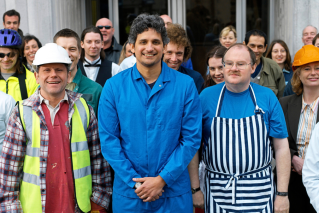Trick of the light could affect your spending habits

That bottle of Grange may become more tempting in the right kind of light. Photo: Getty
Research has revealed the role that room lighting can play in decision-making, with darkness more likely to lead to indulgent choices.
According to Kellogg School of Management research, we experience less of a connection with others in the dark, and are therefore less inclined to consider what others think, instead assigning more weight to authentic desires.
“Ambient light is a very important experience that is easily manipulated,” Kellogg assistant professor of marketing Ping Dong said.
“This shows a new psychological consequence of darkness — consumers more often choose the option that provides immediate pleasure.”
The Kellogg researchers conducted three studies to test how a feeling of psychological distance frees consumers to do what they really want. They did this by manipulating light levels to gauge how participants’ choices changed when offered a utilitarian product as opposed to a more enjoyable one.
The first study saw 103 undergraduate students brought into a room one at a time and asked to imagine they were purchasing a chair, presented with similarly priced options of a utilitarian chair or a hedonic chair. Some students were brought into a brightly lit room and others a dimly lit room, while some were told the chair would be used in a public context and others a private context.
The hedonic chair was more often preferred by participants in the dimly lit room, regardless of whether the intention was to use it in a public or private setting.
The second study involved the researchers asking 180 online participants to make a series of choices, each with a hedonic and utilitarian option. Half were asked to turn on all the lights in their room and half were asked to turn them off and use only natural light, before taking the test.
The researchers again found those in a dark room were more likely to choose a hedonic option, and also expressed greater self-authenticity. This, in turn, led the researchers to ask if this trend could be reversed.
A final study saw 350 online participants engage in the same process, but some participants were asked to list three names of people close to them and a personal experience they had with each one before they answered the questions. Other participants were asked to list three of their facial features.
This time the researchers again found that the majority of those who took the test in the dark opted for the hedonic options, but those who had listed personal connections opted for utilitarian choices, despite being in a darker space.
“When we reminded people of their social connections with others, they didn’t feel disconnected in the dark anymore,” Dong commented.
“It reduced their tendency to act in a hedonic way.”
The research findings could be translated to the world of marketing. For example, marketers may look to change lighting dependent on the type of product they are seeking to sell, potentially using more light for practical products and less for more indulgent products.
The research also notes the impact of lighting across different settings. For instance, in the workplace bright light may help boost productivity, while at home darker light may provoke more indulgent choices.
This article first appeared on Smart Company








